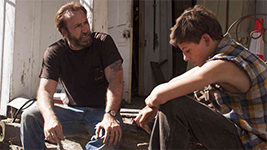Joe
|  Joe, a beautifully, painfully wrought drama about violence and redemption, returns director David Gordon Green to his roots in modest independent filmmaking set primarily in the South, and it couldn’t come soon enough. After spending three years making high-profile, low-brow studio comedies (2008’s Pineapple Express and 2011’s Your Highness and The Sitter), one could have reasonably feared that the director of modest cinematic gems like George Washington (2000) and All the Real Girls (2003) was in danger of being permanently sucked into the Hollywood machine. Joe and his earlier film from this year, Prince Avalanche, suggest otherwise. Joe, a beautifully, painfully wrought drama about violence and redemption, returns director David Gordon Green to his roots in modest independent filmmaking set primarily in the South, and it couldn’t come soon enough. After spending three years making high-profile, low-brow studio comedies (2008’s Pineapple Express and 2011’s Your Highness and The Sitter), one could have reasonably feared that the director of modest cinematic gems like George Washington (2000) and All the Real Girls (2003) was in danger of being permanently sucked into the Hollywood machine. Joe and his earlier film from this year, Prince Avalanche, suggest otherwise.And, as if that weren’t enough, Joe also heralds the return of Nicolas Cage, whose frequent paycheck-cashing appearances in a slew of forgettable action and fantasy movies in recent years (Drive Angry, anyone?) has almost completely overshadowed the immense talent that had him at the forefront of his generation of great actors (it’s been almost 20 years since he won an Oscar for 1995’s Leaving Las Vegas, and his last truly great role was his Oscar-nominated dual performance in Spike Jonze’s Adaptation. more than a decade ago). Those who want to write him off as a punch-line in a bad joke about a good career gone awry should definitely see Joe, as Cage delivers a deeply affecting performance as an ex-con in his late 40s who is constantly at war with himself as he tries to keep his violent tendencies at bay. That violence, which landed him in the penitentiary once and constantly threatens to land him there again, is brought back to a boil via his relationship with Gary (Tye Sheridan), a 15-year-old drifter who, along with his mother and sister, lives under the fist of his violent, drunken father Wade (Gary Poulter). Wade is what Joe would be without any sense of morality and justice; Joe may be a criminal, but Wade is an animal. Joe works as a contractor, managing a crew whose job is to poison trees in order to clear them out so that a lumber company can plant more desirable trees in their place—a profession that is not without its symbolic value in a story that centers entirely around social outcasts, misfits, and undesirables. Green, who was born in Arkansas and raised in Texas, gives the film’s remote, blue-collar central Texas setting a vibrant, gritty lived-in feel. Much of the action unfolds in and around isolated train tracks and heavy woodlands, and when the camera does move inside, it is in older homes with small windows, an overstuffed convenience store, and a hellish whorehouse where Joe finds release and possible companionship with Connie (Adriene Mishler), the Madame who runs it. Much of the film was cast with locals and unknowns, the most notable being Gary Poulter, who was homeless and living on the streets of Austin when Green cast him as Gary’s sadist of a father. Poulter delivers an amazing performance playing a man whose every despicable action is morally unjustifiable, yet still manages to elicit sympathy for his pathetic place in life (tragically, Poulter, who battled substance abuse for much of his adult life, died just a few months after production wrapped). Tye Sheridan, who started as the sensitive younger brother in Terrence Malick’s Tree of Life (2011) and played the lead in Jeff Nichols’s Mud (2013), is equally impressive, conveying his young character’s tragic sense of self with great conviction. Gary is a young man forced to age beyond his years, and like Joe he lives in a constantly simmering state, which is why Joe is drawn to him. Joe was based on the 1991 novel of the same name by celebrated Southern writer Larry Brown. Brown was the subject of the 2002 documentary The Rough South of Larry Brown, which was directed by Gary Hawkins, who wrote the screenplay for Joe and taught Green when he was a student at the North Carolina School of the Arts (both Green and fellow student Jeff Nichols worked on the documentary). Brown had a particular affinity for stories about blue-collar outcasts living on the margins of society in the South, and Green captures the flavor of his writing (particularly the way he, in the words of L.A. Times book critic Richard Eder, “tells a harsh story in an oddly tender way”), while molding it to his own unique cinematic sensibilities. Once again working with cinematographer Tim Orr, Green creates a palpable sense of time and place, infusing Joe with the dirt and sweat and grit that coats the lives of the film’s hard-scrabble characters. The film’s sense of redemption is hard-won in a struggle between depravity and decency that witnesses brutal cold-blooded murder and tragic cycles of abuse and neglect. Yet, Green finds a way to take us out on a note of simple optimism that beautifully balances the film’s darker moments. Copyright ©2014 James Kendrick Thoughts? E-mail James Kendrick All images copyright © Roadside Attractions |
Overall Rating: 


 (3.5)
(3.5)


